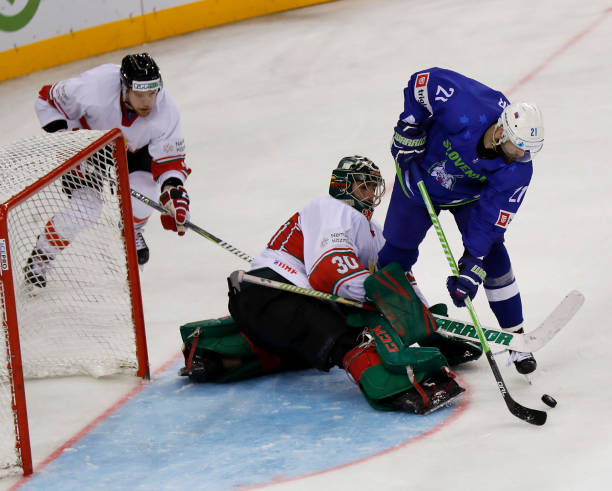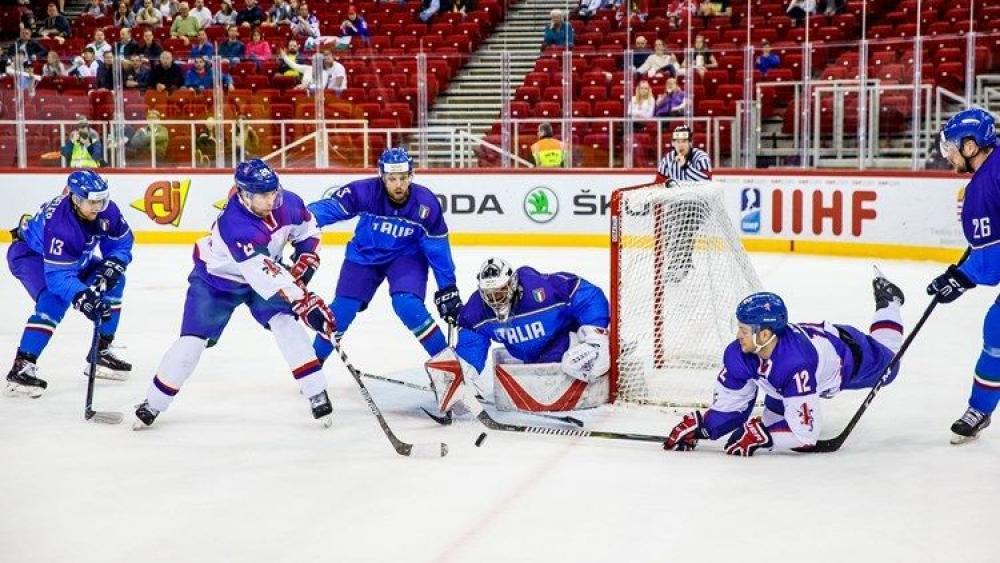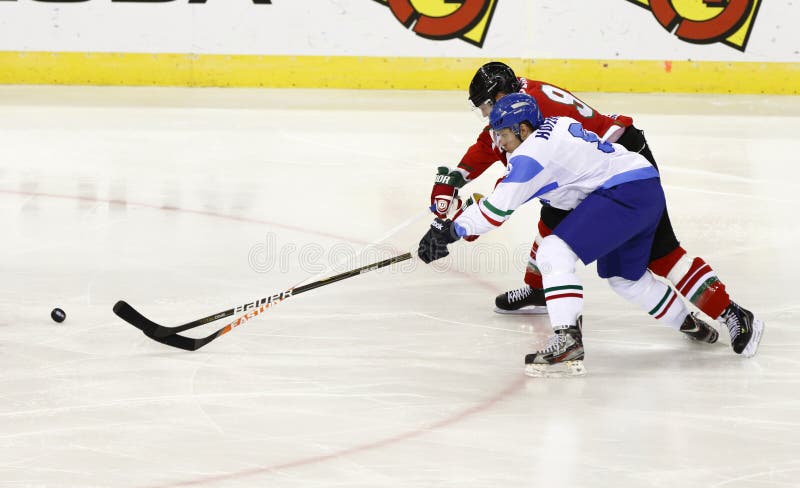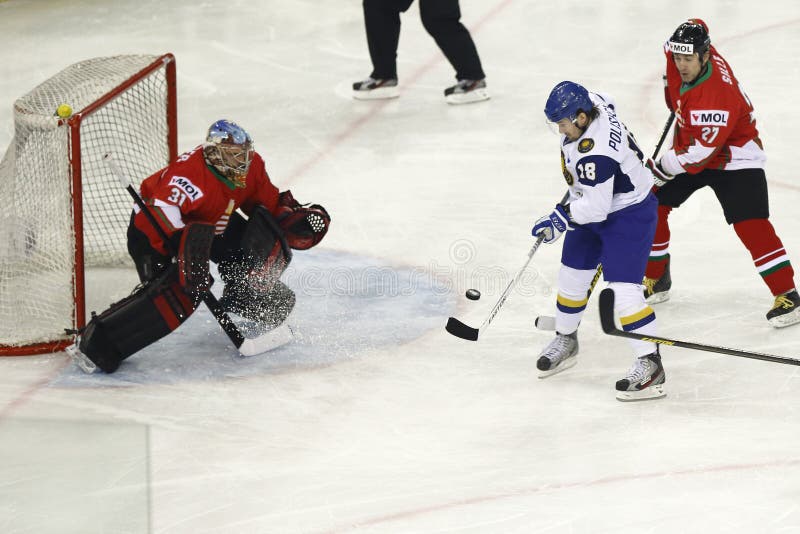
Team GB dramatically returned to Pool A of the IIHF Hockey World Championships last Saturday in Budapest after scoring with just 16 seconds remaining in the tournament. GB, who last played in the top tier of International hockey back in 1993, will be heading to Slovakia next year for potential match ups with Canada, Russia and Finland.
The tournament was one of surprises all round. GB got the proceedings underway at the Laszlo Papp SportArena in Budapest on the Sunday, when they took on one of the favourites for promotion, Slovenia. The tiny nation, which was once part of Yugoslavia, have only seven registered ice rinks back home, but that hasn’t stopped them from punching well and truly above their weight in recent years. They took part in each of the last two Winter Olympics [2014 and 2018], beating team USA in the latter, and along with Italy, had just been relegated from Pool A, a year earlier and were expected to return at the first attempt alongside their neighbours.
Kazakhstan, just missed out on promotion last year, but were once again expected to be there or thereabouts and given their history in the sport were considered to be the third horse in the race. Throw in teams like Hungary, who were hosting the tournament and playing in front of a passionate, sell-out home crowd, and the well-established Poland, then you can see why many considered it was going to be a tough task for GB who, having just gained promotion from Division I B a year earlier, were favourites for relegation.
Within the opening 60 minutes of action, GB had put down a marker of intent, dispatching Slovenia 3-1. Ben O’Connor gave his side the lead with less than seven minutes gone. Despite a quick reply from their opponents, GB were back in the lead before the second intermission courtesy of O’Connor’s Sheffield Steelers team mate, Robert Dowd. Brett Perlini made the game safe early in the third period, which meant the underdogs had made the best possible start.
Having clinched that opening day win over Slovenia, the GB fans were far from getting carried away. ‘I think coming into this tournament we said, if we can just beat Poland and maybe steal another win from somewhere we will be safe for another year in this division.’ said Alison, a GB fan from Newcastle.
Later that day Kazakhstan eased to a 3-0 win over the hosts, Hungary, thanks to a double strike by Yevgeni Rymarev, before Italy saw off Poland 3-1. The following day was full of further surprises with Slovenia losing again, this time 3-2 to Poland. Suddenly it looked like Poland might pose a threat at this tournament, as well as Hungary, who rewarded their passionate home support with a shock 3-2 win over Italy.
GB’s game with Kazakhstan was moved back 24 hours but the extra day’s rest certainly didn’t do them any favours. Despite the Brits taking an early lead through Luke Ferrara, Kazakhstan game storming back when Dmitri Grents levelled on the powerplay. The game changed just after the mid-point of the contest, when the Kazakhs scored twice through Anton Sagadeyev and Roman Starchenko. There was also a lengthy delay as the on-ice officials took their time to review one of the goals and that didn’t help matters either. The Brits then fell apart during a five minute spell at the start of the final period, conceding a further three goals. After the fifth went it Sheffield-born Ben Bowns was pulled from between the pipes in favour of Jackson Whistle, in what became a major realty check to the newly promoted side. Roman Starchenko was Kazakhstan’s top performer having bagged two of his side’s goals, while there were further strikes for Nikita Mikhailis and Alikhan Asetov.
Kazakhstan were back on the ice early the next day against an Italian side with something to prove. Whether it was the fact Kazakhstan had used up all their goals against GB just a few hours earlier, or the fact they were exhausted having played two games in short succession, but either way they were eased aside by Italy in a comfortable 3-0 win.
GB entered Wednesday for their third game with their bubble well and truly burst after that heavy defeat to Kazakhstan. The opening day win over Slovenia was starting to look more like a flash in the pan, especially as they struggled against Poland for much of the game. Brett Perlini gave GB an early lead at 3:02, but that seemed to just stir Poland from their slumber and they were back level when Pawel Dronia converted at 12.21. Colin Shields gave GB their second lead of the game, with less than 90 seconds left in the opening stanza, but it was a lead that didn’t look safe. Sure enough, Poland were level again with just over three minutes gone in the middle period when Damian Zapica scored.
By the midpoint of the game the Poles had taken the lead through Krzysztof Zapala, and it looked increasingly likely that it wasn’t going to be GB’s day again. However, whatever was said in the dressing room during the second intermission, clearly worked as GB had a strong final session. Brendan Brooks tied things up with just over 15 minutes left in the game but Poland were still not out of it and looked dangerous on the puck. But a Ben O’Connor goal less than two minutes later gave GB the lead for a third time and with it the momentum too. Poland pushed to try and find another equalising goal but left themselves over exposed at the back and which let in Jonathan Phillips, who grabbed the insurance marker with 31 seconds left.
For me it was probably the best contest of the tournament. The game really could have gone either way at one stage and it just shows how slender the margins are between success and failure, or in this case between promotion and relegation.
Later that day Slovenia skated off with a much-needed victory of their own when they dispatched Hungary 4-1. Slovenia took the lead before Hungary tied it up early in the second period, but Slovenia crucially went back ahead four minutes later. Having lost their opening two games to supposedly lesser opposition, Slovenia had to get a result against a decent host team. They did just that and made it safe with two late goals inside the last 5 minutes.
With most teams taking a rest day, the match-up between Hungary and Poland was moved forward to the Thursday. In many ways this was probably the most important game of the tournament as defeat for either team would almost certainly spell relegation. Poland were particularly concerned as they had the hardest game (on paper at least) on the final day, so for them the need for a positive result was even more vital. Hungary though, who were once again backed by a sell-out crowd got an early powerplay opportunity and converted through Balazs Sebok with just 64 seconds on the clock. Andras Benk then doubled that lead at 9:17 as Hungary looked confident and in control of the game. That though is probably a dangerous position to be in, especially at this tournament and you guessed it, Poland were back level just after the mid-point of the game. Filip Komorski got Poland on the scoresheet with just over five minutes gone in the second period, in what was a fortunate break for them. Aron Chmielewski then tied the game leaving Hungary kicking themselves for not finishing off the several chances that fell their way before Poland scored their first goal. Despite that mid-game slump Hungary were by far the better side and with just 30 seconds gone in the final period Janos Hari gave Hungary the lead again. It would be a lead they wouldn’t surrender again and helped to propel them back to within a shot of promotion. For Poland they were left to contemplate relegation and to look ahead to that final day match-up with table toppers Kazakhstan.
Friday saw two huge match-ups with results going against form. Kazakhstan who, with a win would have just about clinched promotion, ended up losing 5-3 to Slovenia, who themselves were back from the dead to be in with a shout come the final day. Slovenia took an early lead, only to see that wiped out just over a minute later when Kazakhstan levelled through Yegor Petukhov. Dmitri Grents then gave Kazakhstan the lead by 10:48 but five minutes later Slovenia ensured the teams would go into the first intermission level. Goals from Verlic and Kovacevic then put Slovenia in the driving seat, but Alikhan Asetov pulled one back with just under two minutes left in the second period. Verlic then got his second of the game, in the third period to make the contest safe for his side.
Three times GB took the lead and three times Italy came back to tie the game in what was a seven goal thriller on the Friday evening. Both teams incredibly combined for three goals in just 66 seconds. Brett Perlini opened the scoring for GB in the seventh minute but Alex Lambacher had levelled for Italy 22 seconds later, before Sheffield Steelers-forward, Robert Dowd had GB back ahead 44 seconds after that, as the crowd barely had time to retake their seats.
Thomas Larkin had Italy level again at 13:30 to ensure both sides were level heading into the middle session, but GB would take their third lead of the game at 22:10 through Ben O’Connor. After so many goals were scored early on in the game, the crowd were spoilt but they would have to wait some time to see the next puck in the net. However, what the next twenty or so minutes lacked in goals, more than made up for in drama, angst and excitement as both sides were looking for the win which would almost clinch promotion.
Italy were overwhelming favourites and being the traditionally stronger side, that was correctly so. Even when GB took the lead it kept feeling as though they were stealing it. Then at 45:08 Giulio Scandella netted for Italy’s third equaliser of the game, with most people believing they would go on to get the win now. Common sense would usually support that theory but this tournament was anything but about common sense. Brett Perlini got his second goal of the night at 48:44 and with that there was now a strong belief that GB could actually claim the win now and do the unthinkable.
Italy started to run out of ideas and despite going close a couple of times couldn’t answer for a fourth time. GB had done the near impossible, they were just one point away from guaranteeing promotion. As the British fans poured out of the arena and into the fan zone just about every possible permutation was discussed in various conversations.
As it stood a point (gained from a tie during regulation time), would be enough to promote GB. Who would join them? well that was anyone’s guess. Kazakhstan, Italy, Slovenia and Hungary all had identical 2-2 records, meaning it would be any two of five teams that could end up promoted. GB had the edge but only a slender one. As for relegation, if Poland failed to beat Kazakhstan they were down, however a win for them would mean a chance of survival, and any one of the three teams missing out on promotion could in theory be relegated.
The first game of the final day of action made things slightly more clear as we were rewarded with a straight-forward win for Kazakhstan who dispatched Poland 6-1. Roman Starchenko was the star of the show as he netted four times while there were also goals for Pavel Akolzin and Ivan Kuchin. Krzysztof Zapala did score for Poland to make it 3-1 at one stage, but that was as good as it got for them, as relegation was confirmed. It was a shame as Poland were undoubtedly better than their results perhaps showed, but they just never seemed to get over that heart-breaking loss to GB on matchday 3. For Kazakhstan they had to sit and wait. They finished with a 3-2 record but depending what happened in the next two games promotion wasn’t confirmed. As it stood GB and Kazakhstan were promoted.
The game between Italy and Slovenia had more twists and turns that a stretch of road on the Amalfi Coast. Markus Gander gave Italy an early lead on the powerplay which they held for the majority of the opening session. However, Matic Podlipnik scored for Slovenia at 17:11 to tie things up. Slovenia were then given a powerplay of their own early into the second period and Rok Ticar made it count as he converted to give his side their first lead of the game. Italy came roaring back though and Michael Sullivan duly responded six minutes later which was also courtesy of having the man-advantage, before Alex Trivellato gave Italy the lead at 33:43 to put themselves back in the driving seat once more.
Slovenia were not quite finished yet though, and with both sides knowing full well a win could mean promotion but a defeat would guarantee missing out, they had to go for it and did. Sabahudin Kovacevic scored to make it 3-3 late in the second period.
The final session was a nervy affair for both sides with neither wanting to make a mistake so late in the game. However, Slovenia were the more pro-active of the two sides and decided to go all out to win the contest before it went into overtime by pulling their goalie for the extra attacker with 48 seconds to go. It would be a gamble that would back-fire on them though as Diego Kostner slotted home into the empty net to give Italy the win with just two seconds left. Slovenia were enraged and accrued a Bench minor penalty at the end of the game. That now meant that Slovenia were out of the running for promotion but Italy were joint top with Kazakhstan.
The fifteenth and final game of the tournament was one that looked to be almost beyond GB. Having clinched a dramatic win over co-favourites Italy the previous evening, the Brits needed just a point to secure promotion at the first attempt (the side had been promoted from Division I B just a year earlier when hosting the competition in Belfast). However, they found themselves a goal behind in the first period when Christopher Bodo gave the hosts the lead on the powerplay. Backed by a vociferous sell-out home crowd, the Hungarians had now given themselves a chance at promotion too.
That lead was doubled less than two minutes into the final period when Csanad Erdely scored to give Hungary what looked like the clinching goal. The players and fans were now both sensing that history could be made. Indeed had the game ended there we would have had four sides [Kazakhstan, Hungary, Italy & GB] all tied on nine points, but it would be Kazakhstan and Hungary who would have been promoted.
The difficult part having seemingly been done in earlier victories against Slovenia and Italy meant all GB had to do was secure a point against Hungary. Easy right? clearly not. Hungary were playing their games in front of a passionate crowd and having beaten Italy themselves earlier in the tournament were obviously a side capable of challenging for honours.
But GB have the kind of resilience that defies all common sense, they never know when they are beaten and in a competition full of shocks and surprises they delivered yet another one. Billingham-born Robert Dowd, who had an excellent tournament halved the deficit with just over 9 minutes to go, but despite giving up that goal, the mighty Magyar’s seemed intent to absorb the Brit’s pressure and looked like they would just about hang on to a game they looked in total control of during the opening fifty minutes. Indeed the hosts could have easily added two or three more goals to their tally which would have made the game more than safe, as it seemed the weight of expectation was playing on the minds of the Brits.
In the end though, those missed chances proved costly for Hungary. Robert Farmer scored for GB with just 16 seconds of the game to go, as they tied the game up whilst having an empty net for the extra attacker. It was a goal that would completely change the outcome of the group too and in deciding which of the teams would be promoted.
With the score now even at two, the hosts knew they had little time to find a response, although they did create a couple of half chances in those dying seconds, they couldn’t find a way past goalie, Ben Bowns, who was outstanding between the pipes. The clock slowly ticked down to zero and then the emotion began pouring out all across the arena. While the Brits celebrated wildly on their bench, they were joined by the Italians who were downing beers in the stands, celebrating the fact the Brits had just done them the biggest of favours. On the other side was the Hungarians who looked absolutely distraught at the realisation of their big chance, and probably their best ever chance of promotion has just slipped away.
The Brits continued to celebrate their success despite the game technically not being over. We still had the formality of overtime and then a shoot out to decide the outcome of the contest. Neither team could care by then though, GB had done what many thought was impossible just a week earlier and that was secure a place at the top table, they were ecstatic before overtime began while Hungary just wanted to leave the ice and contemplate what might have been. It would be GB who would eventually claim the win courtesy of a shootout, but that was lost amongst all the celebrating, all that mattered was that they were back in Pool A for the first time in 26 years.





No comments:
Post a Comment